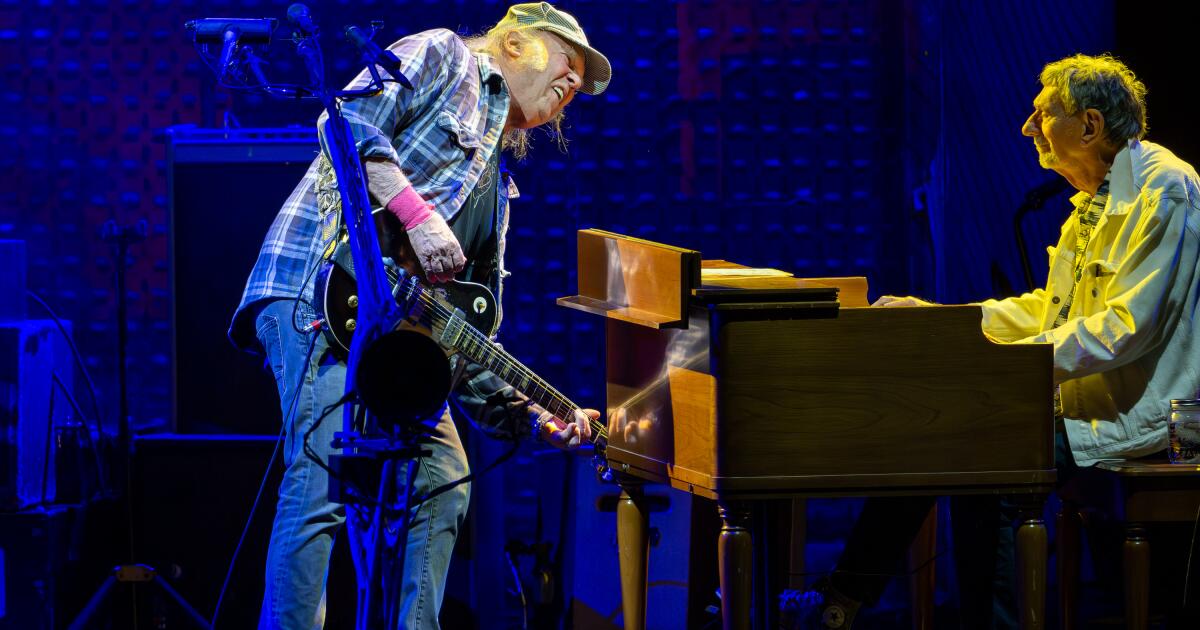The jeans. The flannel shirt. The silvery mutton chops peeking out from beneath a weather-beaten train engineer’s cap.
Neil Young had dressed perfectly for the part of Neil Young on Monday night at the Hollywood Bowl, and he’d brought just the right songs too, among them “Harvest Moon,” “Ohio,” “Only Love Can Break Your Heart,” “Hey Hey, My My (Into the Black),” both “Southern Man” and “Old Man,” as well as “Cowgirl in the Sand,” the last of which he punctuated by telling the audience that he’d first played the hillside amphitheater with Buffalo Springfield in 1966.
“Finally made it back here,” he added with a little grin.
Considering how ambivalently Young has pursued traditional rock stardom over the intervening decades, you could look at his Love Earth tour — which the 79-year-old wrapped with Monday’s two-hour show after three months on the road — as the work of a crank in his dotage giving in to popular demand and doing the hits everybody wants to hear.
But listen to what those hits are saying.
Neil Young at the Hollywood Bowl.
(Michael Owen Baker / For The Times)
“I heard screaming and bullwhips cracking,” he sang in “Southern Man,” about the importance of remembering slavery’s brutality; “Soldiers are gunning us down,” he sang in “Ohio,” about Americans under the rule of their own military.
About halfway through the gig, Young sat down behind a piano and played “Long Walk Home,” an elegiac ballad from the early ’70s that he originally wrote about soldiers returning home from Vietnam before updating it in the late ’80s to take in that decade’s wars in the Middle East; here, he tweaked the song’s lyrics again to wonder why we “broke our word” to Ukraine and asked, “America, where have we gone?”
Pretty bleak stuff for a boomer icon in his crowd-pleasing era.
The Love Earth tour follows this summer’s “Talkin to the Trees” LP, for which Young convened a new band called the Chrome Hearts featuring guitarist Micah Nelson, bassist Corey McCormick and drummer Anthony LoGerfo — they all play in Promise of the Real, which has previously backed Young — as well as organist Spooner Oldham, who’s known for the Southern soul classics he helped create as part of the mid-’60s music scene in Muscle Shoals, Ala.
At the Bowl, Oldham came onstage in a wheelchair, which prompted Nelson to explain that the 82-year-old had cracked his pelvis in a “freak basketball accident” the other day.
“I just didn’t want you mistaking him for a frail old man or something,” Nelson added.
Young offered a single tune from “Talkin to the Trees” in “Silver Eagle,” a folky riff on “This Land Is Your Land” that he said he wrote after his bus driver suggested he write a song about his bus. He also played a stomping fuzz-rock jam he and the Chrome Hearts dropped just this month called “Big Crime,” which takes specific aim at President Trump with a chant of “No more great again.” (Not his sharpest critique, perhaps, though the crowd at the Bowl seemed duly moved by the sentiment.)
Micah Nelson, from left, Corey McCormick and Anthony LoGerfo of the Chrome Hearts perform with Neil Young on Monday night.
(Michael Owen Baker / For The Times)
Yet what lifted the show was the urgency Young was still finding in the oldies: the squalling interplay between his and Nelson’s guitars in “Cowgirl in the Sand,” the driving tempo of “Like a Hurricane,” his sneering contempt for environmental abusers in “Be the Rain” and “Sun Green.”
Nobody would say the Chrome Hearts were as gloriously crusty as Crazy Horse, and at times you had to smile at the band’s intergenerational presentation, with Nelson looking like Kurt Cobain, Oldham evoking a kindly church elder and McCormick bopping around in baggy jeans like somebody from 311. But when they all bore down on the doomy grandeur of “Hey Hey, My My,” they sounded like a freight train barreling in one direction.
Young closed the show with “Roll Another Number (For the Road),” his ragged country lope from the famously haunted “Tonight’s the Night” LP he released half a century ago. In the summer of 1975, Young was figuring out how to move on from the disillusionment that followed the collapse of the hippie dream; on Monday, he sang the song with the weary abandon of a guy who’s discovered how much disillusionment was yet to come.
